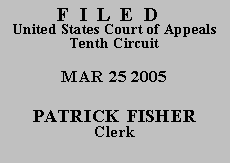

| UNITED STATES OF AMERICA, |
|
| v. | |
| ANTONIO ACUÑA-VALENZUELA aka Antonio Valenzuela Acuña, |
Defendant argues on appeal that he was entitled to a downward departure because, as a result of his wife's ill health and his reason for illegal reentry, his conduct was "'atypical' and 'significantly differ[ed] from the norm' of conduct covered by the guideline." Aplt. Br. at 3 (quoting U.S.S.G. § 1A1.1 cmt. 4(b) ¶ 1). Defendant's argument fails because "[c]ourts of appeals cannot exercise jurisdiction to review a sentencing court's refusal to depart from the Guidelines, either upward or downward, unless the court refused to depart because it interpreted the Guidelines to deprive it of the authority to do so." United States v. Fortier, 180 F.3d 1217, 1231 (10th Cir. 1999). When the record contains only ambiguous statements, we presume that the court "was aware of his or her legal authority to depart but chose instead, in an exercise of discretion, not to depart." Id. Here, nothing in the record suggests that the district court thought it lacked discretion to depart. Of course, the district court had no occasion to express its view on the matter, because Defendant did not request a departure. But that just means that Defendant forfeited the opportunity to obtain the court's view for the record. Defendant should not be in a better position on appeal than if he had raised the issue below and the court had responded.
Moreover, even if we reviewed the merits of Defendant's claim, he would not prevail. Because he did not raise the departure issue in district court, the applicable standard of review is plain error. To prevail on plain-error review, Defendant must show that the district court (1) committed error, (2) the error was plain, and (3) the error affected his substantial rights. United States v. Cotton, 535 U.S. 625, 631 (2002). If those three conditions are satisfied, this court has discretion to notice the error if "the error seriously affect[ed] the fairness, integrity, or public reputation of judicial proceedings." Id. at 631-32 (internal quotation marks omitted).
There is no plain error here. Defendant's circumstances are not the kind that normally merit departure. "In sentencing a defendant . . ., family ties and responsibilities are not ordinarily relevant in determining whether a departure may be warranted." U.S.S.G. § 5H1.6. Because "family circumstances and responsibilities are a permissible but discouraged factor," they merit departure "only if the factor is present to an exceptional degree or in some other way makes the case different from the ordinary case where the factor is present." United States v. Gauvin, 173 F.3d 798, 807 (10th Cir. 1999) (internal quotation marks omitted). We have held that circumstances similar to Defendant's did not merit such a departure. See United States v. Reyes-Rodriguez, 344 F.3d 1071, 1076 (10th Cir. 2003) (chronically ill mother and blind father); United States v. Archuleta, 128 F.3d 1446, 1451 (10th Cir. 1997) (sole responsibility to care for two children and diabetic mother). Failure to depart downward was probably not error at all; it certainly was not plain error.
Finally, we need not address the effect of the Supreme Court's recent decision in United States v. Booker, 125 S. Ct. 738 (2005). Defendant's brief was filed November 29, 2004, after the Supreme Court had decided Blakely v. Washington, 542 U.S. ___, 124 S. Ct. 2531 (2004), and had granted a writ of certiorari in Booker on August 2, 2004. Indeed, both Blakely and the Supreme Court's grant of a writ of certiorari in Booker preceded Defendant's August 17, 2004, sentencing hearing. Defendant did not raise a Booker issue either at his hearing or on appeal. We decline to do so sua sponte.
We AFFIRM the judgment below.
ENTERED FOR THE COURT
Harris L Hartz
Circuit Judge
*.After examining the briefs and appellate record, this panel has determined unanimously that oral argument would not materially assist the determination of this appeal. See Fed. R. App. P. 34(a)(2); 10th Cir. R. 34.1(G). The case is therefore ordered submitted without oral argument. This order and judgment is not binding precedent, except under the doctrines of law of the case, res judicata, and collateral estoppel. The court generally disfavors the citation of orders and judgments; nevertheless, an order and judgment may be cited under the terms and conditions of 10th Cir. R. 36.3.